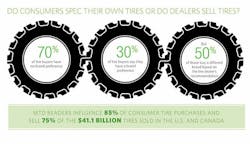Influence: How to Use Your Power for the Good of the Customer
Almost nothing I can think of could have more influence in our industry than a sales person at a sales counter who understands the power of influence.
By definition, influence is a “compelling force,” a force that effects the actions, behavior and opinions of others. Whether you see yourself as an influencer or not, you are. Your influence and your ability to influence others is based, in part, on people and circumstances that influenced you in your past, continues today, and is largely true in your future. My simple hope is that this article will influence you to evaluate your influence as it pertains to serving others in our industry and to exercise your influence with ever-increasing effectiveness.
Your posture, your tone, your demeanor, your knowledge, your prejudice, your motivation, your education, your responsibilities, your moral compass, your energy level, and your beliefs affect your behavior and your ability to influence. Your environment also affects your influence, your employer, your coworkers, the types of customers you deal with, your working conditions and your willingness to change and effect positive results for others. Nearly any of these touch-points, with a little focus and effort, can improve your daily contribution.I’m continually amazed at the potentially far-reaching effects of small, positive changes.
The graphic in this article points to the powerful influence that is demonstrated at sales counters around the country every single day. Clearly, 50% of all final tire purchase decisions are influenced at the sales counter or in the showroom by counter sales staff. Some articles I’ve read regarding the consumer packaged goods (CPG) industry point to this powerful statistic: As high as 72% of final product/purchase decisions are made at the point of sale, in the store.
When consumers are selecting packaged goods from a shelf, they read the labels, look at the box design, and then make the final decision in a matter of moments. One more point to ponder, a recent study by a leading research firm indicates that consumers now rely and prefer “friendly/knowledgeable” assistance when making purchases. The table is set; you are the influencer, the difference maker, the compelling force, the one with the capacity and the power to effect actions and behavior.
Purchasing tires is more challenging than selecting a product off the shelf at a pharmacy and considerably more expensive. Searching online for solid research is still less than ideal as most websites lack compelling comparison tools, and abandonment rates are high. There is no denying that the internet has had tremendous influence on tire search and research and will continue to do so, but the most powerful influence for tire purchases today is still at the retail sales counter.In a recent study done by MasterCard, their research showed 63% of shoppers want more information than they did two years ago. The article highlighted a key factor that drives consumer behavior: comparison. Comparison alone drives a good deal of shopper behavior. I point this out because consumers of tires are looking for value, which is a combination of convenience, helpful recommendations, knowledgeable assistance, price, and warranty coverage. Two of these value points are objective, the price and warranty; they are facts. Three are subjective; convenience, recommendations, and knowledgeable assistance are dependent on the sales staff to add the necessary value in a consumer’s research. This is where the influence comes in.
The answer to a convenience question is more than the, “Come on down,” or, “We have a bay open now,” or, “We work on a first-come, first-served basis.” These answers must be personal and delivered with real concern and care. As for knowledgeable, if the study by MasterCard tells us anything, it’s that consumers are comparing. It’s not like we don’t feel the pre-purchase comparisons every day in our conversations with consumers, but we must offer real, solid, knowledgeable recommendations that meet the value expectations of each individual customer.
The survey revealed another interesting point. Shoppers feel as though they are smarter shoppers then they were two years ago; 82% felt this, and 87% said technology makes it easier to find the product they want. In others words, consumers are more confident of their findings, so we better be better listeners and make solid, knowledgeable recommendations. If our recommendations are contradictory to the consumer’s findings, even if the shopper is wrong, we must find a way to agree on certain points. Remember, you’re an influencer, more powerful than a speeding internet, a compelling force for good, able to produce actions and beliefs for the good of others. Winners help customers win. ■
To read more Counter Intelligence articles, see:
Building Trust Through Engagement Skills
Selling + Serving = Retailing: Create Confidence and Build Enthusiasm to Make Sales
There Are Only Two Problems You Can Have in a Tire Store
Beware of Routing Dullness: Invest $25 and a Little Time in You and Your Career
Leading Up the Hill or Off the Cliff: Make Your Employees See the Light or Feel the Heat
About the Author

Bob Ulrich
Bob Ulrich was named Modern Tire Dealer editor in August 2000 and retired in January 2020. He joined the magazine in 1985 as assistant editor, and had been responsible for gathering statistical information for MTD's "Facts Issue" since 1993. He won numerous awards for editorial and feature writing, including five gold medals from the International Automotive Media Association. Bob earned a B.A. in English literature from Ohio Northern University and has a law degree from the University of Akron.
